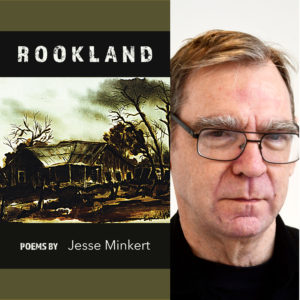Jesse Minkert’s new collection ROOKLAND, rises to the occasion of its title. The dictionary tells us that the rook is a “barefaced” and “gregarious” bird. Those concerned with literary antecedents will recognize roots in Edgar Allen Poe’s raven and Ted Hughes’ shameless, raucous “Crow.” A sharply intelligent adapter to city life, Minkert cries his bold, unwanted truths from the treetops:
Congratulattions, Timmy. You’ve found a disappearing place good enough to last until the rookssnatch your spore from the wind.
–Belle Randall, Poetry Editor of COMMON KNOWLEDGE, (Duke University Press)
Reading Jesse Minkert’s poems is like walking down the dark alleys of a strange city and finding there glittering bits of the human condition. His images are multi-faceted and compel the reader to examine the feelings they evoke.
–Clarice Keegan
The poems in Rookland transform the big into the little and then make the little big again. From the chain of reactions from weakening rings to the lives transformed, from the interruption in the courage to love by a dog’s playful love, a spill on a cushion that reveals intimacy’s cruel angle. These poems tell stories with words that simultaneously surprise and feel right, language precise and mysterious. Poems readers can revisit discovering the big in the little and back again.
–Greg Metcalf, Author, Flowers in Concrete
Jesse Minkert’s people are such thoroughly modern creatures. Up to the minute as alarm clocks set to go off and wound tight. Flung with an unexpected force. Many of them are queens in their domains, adequately flawed, sweetly problematic, each an edifice in a crumbling pastiche of failed relationships, who proceed as if feelings were an inconvenience, a slip of the poorly curbed tongue. As if flesh could be sloughed away for an off-planet weekend romp, then the spirit recovered like a sofa, delivered back to work. The denizens of Rookland frolic and misbehave, treat the duties of affection lightly, but do not escape. “They’ve sent us kids to Cleveland for the winter,” one admits. Aside from this and a few other iron-on transparencies, Minkert lets the facts speak for themselves. A guy in an overcoat eats canned soup and texts lies to his lost love. Who’d want to hear their complaints. Only public lies and private truths need apply.
–Paul Hunter, Poet and Publisher, Wood Works Press





